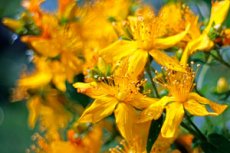Medical expert of the article
New publications
Preparations
St. John's wort for coughing bronchitis
Last reviewed: 03.07.2025

All iLive content is medically reviewed or fact checked to ensure as much factual accuracy as possible.
We have strict sourcing guidelines and only link to reputable media sites, academic research institutions and, whenever possible, medically peer reviewed studies. Note that the numbers in parentheses ([1], [2], etc.) are clickable links to these studies.
If you feel that any of our content is inaccurate, out-of-date, or otherwise questionable, please select it and press Ctrl + Enter.

This plant is quite common in the fields of Ukraine. Another thing is that not everyone knows what it looks like and what useful properties it has.
St. John's wort does not have pronounced expectorant properties, but it has good antimicrobial and anti-inflammatory effects, and also strengthens the immune system and improves the condition of the respiratory tract mucosa. All this helps reduce irritation of the inner surface of the bronchi and reduces the severity of cough.
 [ 1 ]
[ 1 ]
Dosing and administration
Most often, in the treatment of bronchitis, an infusion of dry or freshly cut grass together with inflorescences is used. For 1 liter of boiling water, take only 2 tablespoons of chopped plant material. Infuse the "medicine" for 30 minutes in a warm place (it is better to use a thermos).
The infusion should be taken 100 g 3 or 4 times a day warm. It can be sweetened with honey or sugar, added to other teas and drinks.
To treat a wet cough, St. John's wort infusion should be used in combination with expectorants, such as plantain syrup.
Contraindications
The properties of St. John's wort can be harmful to patients with allergic reactions to the plant, severe mental illness, and consistently high blood pressure. In pediatrics, St. John's wort-based products are permitted for patients aged 12 and over. Such medications should not be used during pregnancy and breastfeeding, as well as before and after transplant procedures.
Side effects St. John's wort
Folk and pharmaceutical remedies based on St. John's wort can:
- increase the body's sensitivity to sunlight and allergens such as dust and pet hair,
- cause headaches and anxiety, reduce endurance,
- cause abdominal and liver pain, bowel upset and loss of appetite, dry mouth or a bitter taste in the mouth,
- provoke the development of iron deficiency anemia,
- With prolonged use, it can reduce potency in the stronger sex.
 [ 5 ]
[ 5 ]
Interactions with other drugs
Internal use of St. John's wort should not be combined with oral contraceptives, some antibiotics (for example, cyclosporine), digoxin, the antiviral drug Indinavir, theophylline (accelerates their elimination from the body, reducing the specific effect), anesthetics (shortens the duration of action), anticoagulants, antiulcer drugs and antacids.
In combination with antidepressants, St. John's wort increases their side effects, such as dizziness, headaches, and cloudiness of consciousness. The most severe symptoms are observed in elderly people.
Caution should be exercised when combining St. John's wort with therapy with drugs that can cause photosensitivity.
St. John's wort does not combine well with medicines used to treat hay fever, nasal drops, and narcotic substances. Unpredictable results can be observed when treating with St. John's wort if you indulge in coffee, alcoholic beverages (wine, beer), cocoa and chocolate, smoked foods, marinades and pickled products, and yoghurts.
Storage conditions
St. John's wort is harvested during the flowering period of the plant, picking flowers with tender upper parts of shoots. It is recommended to collect flowers 5 days after their blossoming throughout the day. The main thing is that the flowers are dry, otherwise they can simply rot during drying.
It is best to dry St. John's wort in natural conditions with good ventilation and protection from the sun. It is necessary to ensure that dew does not appear on the flowers in the morning hours, so it is better to bring them indoors at night. If you dry the raw material in a dryer, the temperature should be set below 50 degrees.
Dry raw materials can be stored in cardboard or wooden boxes, fabric bags in a dry room for no more than 2 years.
Attention!
To simplify the perception of information, this instruction for use of the drug "St. John's wort for coughing bronchitis" translated and presented in a special form on the basis of the official instructions for medical use of the drug. Before use read the annotation that came directly to medicines.
Description provided for informational purposes and is not a guide to self-healing. The need for this drug, the purpose of the treatment regimen, methods and dose of the drug is determined solely by the attending physician. Self-medication is dangerous for your health.

